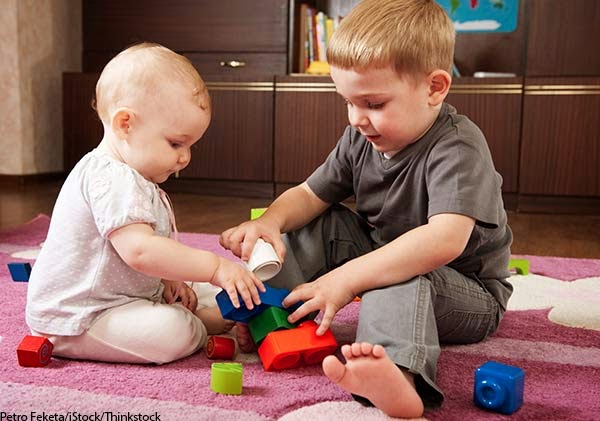In the May 26, 2014 issue of The New Yorker, a cartoon by Paul Noth caught my eye. Two young adult women are sitting on a sofa, glasses of wine at hand. Through a doorway, a toddler is sitting on the floor with a few toys nearby, arms stretched out to her side, her mouth open in a wordless howl. The caption reads, “Oh, she just wants attention or needs help.”
I found myself reading it several times, with and without the word “just.” What a difference one word can make! “She wants attention or needs help” tells us about two of her basic needs. “She just wants attention or needs help” dismisses those needs as perhaps irrelevant, certainly inconvenient , and with a hint that she’s doing it on purpose. It also reflects on the sometimes wearisome requirement of parenting to BE attentive, on your child’s terms, day and night.
Wanting attention and needing help are at the core of a young child’s life and often require parents to become detectives in figuring out how to respond. This dilemma is what often brings parents in to talk with me as a parent educator. There’s something in their child’s behavior that leaves them feeling frustrated, bewildered, helpless, hopeless, or even angry. Sometimes they are hoping I can make suggestions that will “get their child” to stop whatever they are doing. But I guide them in a different direction, one based on the assumption that their child’s behavior is the expression of an important need by a person who is still developing her or his ability to communicate. “She just wants attention or needs help!” Exactly! She’s doing her best by crying to let her mother know.
This approach to “decoding” a child’s behavior leads to interesting insights and better outcomes. With each behavior that concerns parents, I ask them to consider, “What need is your child expressing? What can be done to meet the need so the behavior will change?” That’s when I pull out my handout, Basic Human Needs, and we review the list of needs:
Physical needs
- Have food, sleep, safety, health
- Express our developmental stage
Information and Education
- Express curiosity
- Explore and experiment
- Learn about people, places, and things
Fairness
- Feel respected
- Experience justice and equality
Boundaries
- Feel safe and secure in relationship to others
- Have personal spaceand privacy
- Know and respect the boundaries of others
Connection and Acceptance
- Feel we belong, fit in, are related to and important to others
- Have unconditional love
- Experience harmony in our family
- Have fun and pleasure
- Express ourselves:
- According to our temperament and personality
- According to our emotional and mental developmental age
- Through both showing and saying
- Learn to handle frustrations and disappointment
- Learn to deal with fear and anger
- Resolve earlier traumatic experiences
Recognition of our uniqueness
- Feel capable and successful
- Feel there’s something special about ourselves
- Feel we know things or can do things uniquely
- Feel free to express ourselves in our own unique way
- Feel creative and imaginative
Power
- Believe we can do what we set out to do and get the things we need to do it
- Feel confident we can handle things, even challenging things
- Feel we’re in charge of our own lives — not always dependent
- Feel others can’t make us do what we really don’t want to do
- Feel confident we can solve problems ourselves
Models of how to behave
- Know and understand the rules, limits, and expectations of others
- Have consistent values and beliefs to guide us
- Know what is socially acceptable behavior
- Have a sense of our own standards
- Know people outside the family who can be positive models
- Feel confident we can tell right from wrong
- Know we can learn from prior experiences
- Have goals for our lives and a sense of purpose
- Feel we can make sense of our lives
Let’s try it out. Your 3-year-old son can be very loving to his 1-year-old sister, but sometimes (and a lot more than you can tolerate) he becomes very aggressive toward her. He sits on her, kicks her, and knocks her over. He’s so fast that you usually can’t get to him before he’s done several things and she’s wailing. You describe yourself as the “reactor” in the family, so pretty soon you’re talking loudly and sternly and ultimately yelling. Your partner is much calmer, and your son usually runs to him when you’re upset. You’re left feeling your relationship with your son, your partner, and yourself is strained.
There are many directions our consultation could go. We could talk about strategies for intervening in the moment. We could talk about how you could manage your frustration better. We could talk about how you and your partner could work to be on the same page, supporting each other. We could talk about ways to communicate your expectations to your son and plan for logical consequences when he doesn’t comply. Or, we could ask the question, “What needs does his behavior express, and what can I do to meet his needs so he doesn’t have to try and do it himself in this way?”
We would then consider the list of Basic Human Needs as pieces of a puzzle that will lead us to a more whole picture of your son’s experience: what it’s like to be him, right now. Does his behavior reflect a physical need? For example, does it tend to happen at a time of day when he’s hungry or tired? Does it reflect an information or educational need? Perhaps he needs the information that hitting his sister won’t make her go away. Does it reflect a need for fairness? That could be. It’s not fair that mom is spending so much time with a baby who doesn’t have to clean up her toys. What about his need for boundaries? Yes, his need to have boundaries set for him by loving adults since, developmentally, he’s not able to do it for himself very well. He also needs his own personal space and privacy — maybe a special area with things of his that the baby can’t touch. His need for connection and acceptance may, for example, include feeling insecure about where he “fits” in the family. He may need reassurance. With a sister in competition for attention, he may no longer feel there’s something special about himself. Hearing about the things he can do that his sister can’t do may help him feel unique. Without a doubt, he’s not feeling any power. No one asked him if he’d like some competition. And maybe a day with his two older cousins will give him a positive model of how siblings can get along and enjoy each other.
I invite parents to work from these general ideas and come up with specific strategies to experiment with, strategies that could increase the likelihood of their son’s needs being met without his having to resort to bashing his sister.




